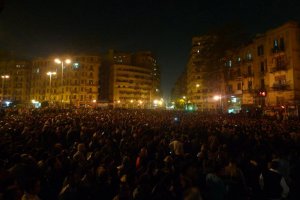Mish Ayazeenu: We don't want him
Egypt’s anti-regime protests are unprecedented in size, frequency and ferocity. In Shubra, Dokki, Mohandaseen and Bulaq, Cairenes chanted ash-sha’ab yureed isqaat an-nizam, or The People Want the Fall of the Regime, and braved tear gas and baton-wielding thugs in the central Tahrir Square. Alexandria, Tanta, Suez, and the labour stronghold of Mahalla al-Kubra have also demonstrated. A government building has been burnt in Suez. Posters of Mubarak have been ripped down and burnt in several locations. Mish ayazeenu, the people shout: We Don’t Want Him.
When January 25th’s Day of Anger started, police at first allowed protesters to move freely in the streets. This was unusual, and suggests fear on the authorities’ part, as does the abrupt shift back to traditional methods as night fell. At the time of writing, at least a thousand people have been arrested, several killed, and hundreds beaten. (Here’s an audio recording of Guardian journalist Jack Shenker’s experience being trucked into the desert with other protesters.) Uniformed police are backed up by plainclothes goons, many armed with iron bars. (One hopes that someone is collecting photographs of these people in order to identify and shame them.)
Certain developments illustrate why Mubarak’s regime will be harder to dislodge than Ben Ali’s. Trades Unionists have been at the forefront of Tunisian change; in Egypt the state’s co-opted ETUF has ordered its branch heads to suppress protests. And the country’s largest opposition party – the Muslim Brotherhood – has so far played a negligible role. When the regime, predictably, blamed the Brotherhood for organising the protests, the Brotherhood quickly claimed its innocence. Indeed, events seem to have taken the Brothers by surprise. It may be that the leadership has gambled on regime survival, either for pragmatic reasons or because what Brotherhood ideologues consider the ‘Islamisation’ of society is proceeding smoothly under the Mubarak status quo. But the demonstrations have been bigger than anyone expected, and this Friday’s after-prayer protests may make the Brothers more visible. Interestingly, al-Azhar clerics, often tools of the regime, have ruled that protestsdo not counter Islamic precepts.
The initiators of what is now perhaps a growing intifada organised the protests in the name of Khaled Said, a blogger beaten to death by police, now become Egypt’s Mohammed Bouazizi. These organisers, and the trapped and wounded, and those prepared to meet state repression tomorrow and the next day, are to be praised and congratulated for their bravery, and envied for their privileged position as agents of historical change. If nothing else has been achieved, Gamal Mubarak’s hopes of inheriting the kingdom from his father must now have been dashed.
Revolutionary momentum is still carrying Tunisia, where journalists have taken over the media, and now it’s rolling through Egypt. If the coming days show sustained and spreading protest, the crack that has appeared in Egypt’s order will rapidly expand. The West is bracing itself. Another fait accompli, this time in the Arab world’s most populous nation, on Palestine’s border, would be a nakba for Western control. So the American administration is immediately speaking of Mubarak’s “opportunity … to implement political, economic and social reforms to respond to the legitimate needs and interests of the Egyptian people.” The phrase “managed change” is uttered. You can be sure America’s managers are hard at work. What they have to lose in Egypt is as incalculable as what the Egyptian people have to gain.
Robin Yassin-Kassab is a UK-based journalist and novelist. This column originally appeared on his blog. Reprinted with his kind permission.
























